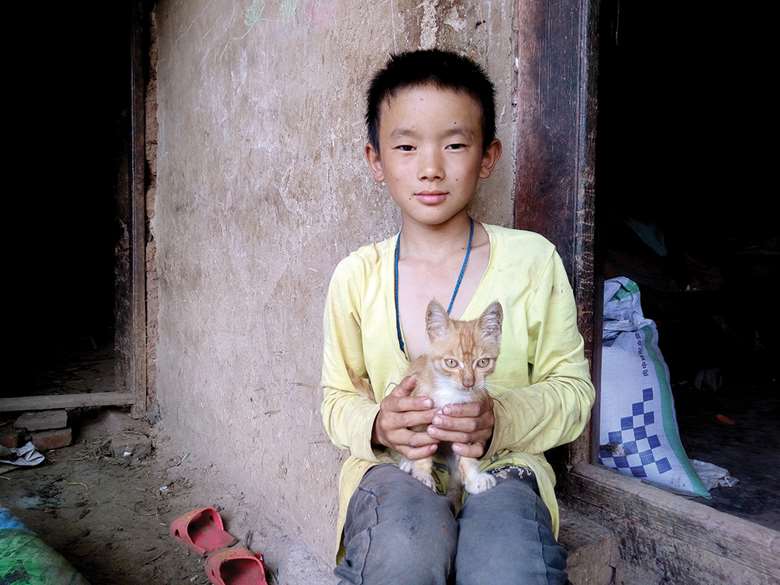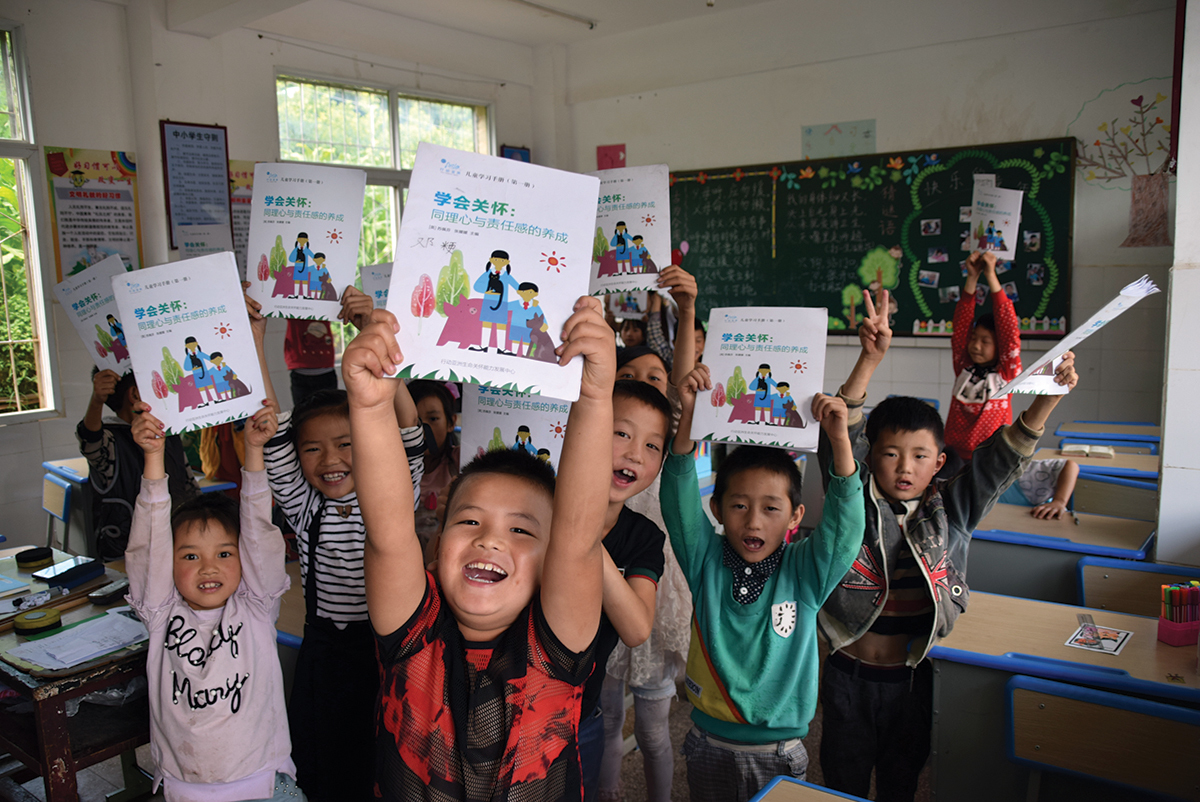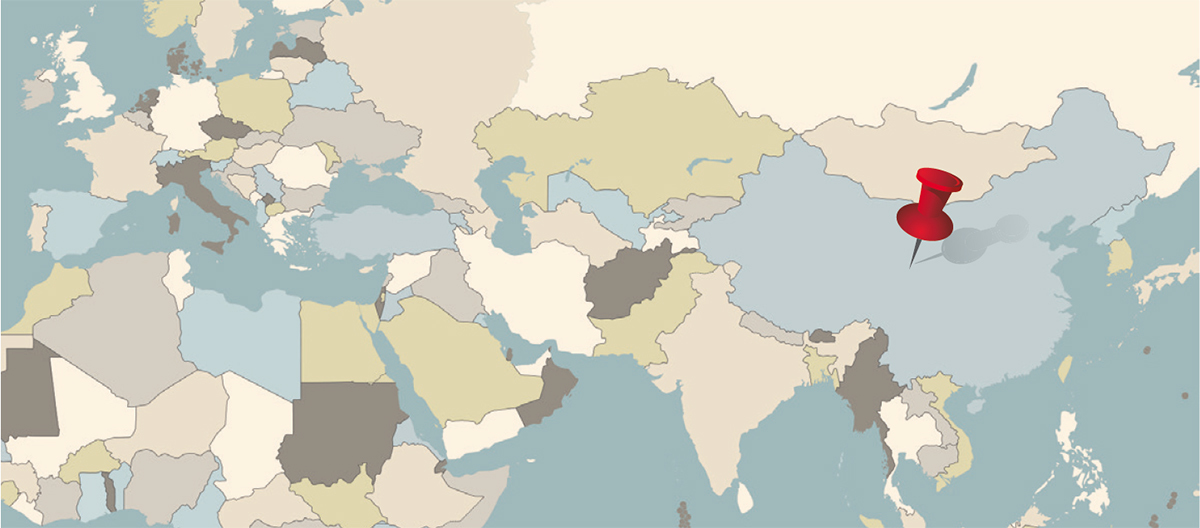International Focus: Humane education, China
Sophie Eminson
Tuesday, February 27, 2018
Programme educates children to be more aware of the natural environment.

China has 1.3 billion citizens, 20 per cent of the world's total population. Its huge economic growth and industrial expansion in the past 20 years has seen living conditions and material wealth rise significantly for much of its population. However, this has come at a cost. China is now the number one producer of greenhouse gas emissions, with growth and profit often put before concerns for the environment, citizens and animals.
In an effort to redress the balance, not-for-profit organisations such as ACTAsia have developed programmes that aim to educate children in Asian countries to be more aware of the natural environment. Such approaches, they say, can also help improve children's attainment and reduce antisocial and aggressive behaviour.
SOCIETY AND CULTURE
Research by ACTAsia has found that many Chinese people do not recognise that animals are sentient creatures with the ability to feel pain, fear and pleasure.
This, they say, can result in children growing up with little empathy for animals and an acceptance they can be physically abused. Animal cruelty can lead to children developing mental health problems and be an indicator of violent behaviour towards people in adulthood.
There is little in the way of animal protection laws in China nor little public discourse about the issue. However, environmental awareness of the impact that mass industrialisation has on the land and communities is growing.
ACTAsia believes that educating children about their impact on animal welfare, citizenship and the environment can help develop a future society that will take greater care of people and the planet.
Its Changing Chinareport showed that learning about the connections between animal cruelty and welfare and environmental protection could help improve children's understanding of both issues.
Many Chinese children from rural areas grow up with family friends or extended family because their parents live in the major cities for employment, sometimes only visiting their child once a year.
Researchers believe this lack of parental contact combined with no siblings - due to the effects of the Chinese government's policy to restrict families to having one child - has increased the risk of children drifting into crime through a lack of guidance and supervision.
CARING FOR LIFE
Established in 2006 by a sociologist and a veterinarian, ACTAsia is a non-profit organisation with offices in the UK, the Netherlands and Australia.
ACTAsia developed its Humane Education: Caring for Life programme to educate primary school-age children in China about caring for animals and the environment to help them to make socially responsible decisions throughout their lives.
Caring for Life was introduced in public schools in China in 2014 as a foundation course based on the United Nations Education, Scientific and Cultural Organisation (Unesco) Four Pillars of Education.
Since 2016, following the four-year pilot programme introduced in 2012, ACTAsia has been working with Chinese school authorities to champion the concepts of empathy and compassion among children. The ultimate aim of Caring for Life is for education authorities to incorporate it into their school's curriculum.

PRACTICE
Developed by ACTAsia in consultation with primary school teachers in China, education and welfare experts, the programme consists of five subject areas (see box). These focus on teaching different aspects of caring for animals and the planet, the connections between care and the sustainability of society and the environment.
The programme applies the principles illustrated in the Cone of Learning by Edgar Dale, which suggests how much people tend to remember in two weeks based on how information is received.
As the Cone of Learning supports the teaching of the Chinese philosopher Confucius, the programme focuses heavily on the concept of doing to understand. Therefore, Caring for Life education is taught practically to encourage better understanding.
Creative activities and interacting in small groups, such as role play and sharing tasks, are used to encourage compassion between friends and active participation while listening to and including their friends.
Throughout, children learn to do as they are taught, which helps them to understand the principles of Caring for Life so they can apply it in the future.
A curriculum for Caring for Life has been developed that teaches elements of the programme at different stages of development. For example, pre-school children can be taught about animal behaviour and empathy, but may lack understanding to learn about euthanasia and pet loss.
IMPACT
Caring for Life has been introduced to 130 primary schools in China, as well as community centres in 10 cities. The programme reaches 65,800 children, with more than 1,300 teachers trained as Caring for Life educators by ACTAsia.
The programme continues to grow, as two ACTAsia staff members went to a Mandarin Immersion school in the USA to train teachers, so that they can incorporate Caring for Life into their school's curriculum.
From the pilot, the Caring for Life experts found that teachers rated students as becoming significantly more pro-social, well-behaved and showed significant growth in overall understanding of the issues related to topics taught through the course.

FACTFILE
- Caring for Life is a Humane Education programme developed by ACTAsia in 2012
- Caring for Life Education is based on the United Nations Education, Scientific and Cultural Organisation Four Pillars of Education
- 82m people in China live below the poverty line on just $1 per day
- In China, moral education is a requirement for schools
- Caring for Life says 61 million Chinese children have parents who work away from home for large parts of the year
- The pilot programme was introduced in three schools in two cities in China
HUMANE EDUCATION: CARING FOR LIFE
- The Web of Life
The connection of all living things; environmental influences; and consumerism - Sentient Beings
Emotions, sense and feelings; the needs of people and animals; and endangered species - Care and Respect
Across cultures, nationalities and species; specific needs; pet animals and how to care for them - Interacting with Others
Human interactions; safe interaction with animals and the environment; understanding how disease spreads from animals to humans - Empathetic Choices
How to recognise the need for compassion and empathy and when to take action; how to make a difference
Source: ACTAsia
IMPLICATIONS FOR THE UK
By Nick Leney, assistant head, Wey Education Schools Trust
The evidential case for Caring for Life within China is overwhelming. But what of the UK? The next generation join a multicultural society with ubiquitous global connections and accelerating change. Young people must adapt to interdependence. There is evidence of declining youth wellbeing. The Prince's Trust annual youth index found young people's happiness is at its lowest since 2010. Unicef's Child Wellbeing Reports present similar evidence.
However, empathy and compassionate education provide the requisite skills for enhanced wellbeing and interdependence in the 21st century.
The UK government's intention to target wellbeing was included in the Children & Social Work Act 2017. The Ministry of Education confirmed that relationship education would be a mandatory feature for primary schools.
Relationship education is an umbrella term with aims related to understanding difference, respect for oneself and others, the removal of prejudice, reproduction and sexual relationships.
Bundling all these issues together means compassion, relationships and respect are lost in the English curriculum. Despite such concerns, making relationships education statutory does offer the opportunity for Caring for Life to be delivered in UK primary schools.
Caring for Life is highly suited for UK multicultural classrooms as it is efficient regarding curriculum time, written to suit a non-specialist teaching team, with aims relating to social responsibility, respect and compassion.




